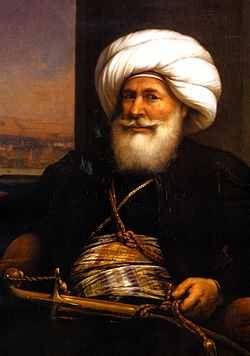Albanians in Egypt
| ||||||||||
| Languages | ||||||||||
|---|---|---|---|---|---|---|---|---|---|---|
| Albanian, Egyptian Arabic | ||||||||||
| Related ethnic groups | ||||||||||
| Albanians | ||||||||||
| Part of a series on |
| Albanians |
|---|
 |
| Nation |
| Communities |
|
| Subgroups |
| Albanian culture |
| Albanian language |
|
|
| Religion |
| History |
The Albanian community in Egypt started by soldiers and mercenaries who settled in the second half of the 18th century and made a name for themselves in the Ottoman struggle to expel French troops in 1798–1801. Muhammad Ali (1769–1849) founded the Albanian dynasty of Egypt which lasted there until 1952. In the 19th and early 20th centuries, many other Albanians settled into Egypt for economical and political reasons. With the fedayeen, Muslim Brotherhood, and the culminating Egyptian Revolution of 1952 the Albanian community in Egypt diminished.
Mehmed Ali Era
Mehmed Ali made good use of their services as mercenaries and troops to bolster his reign. Albania mercenaries, or Arnauts, presented the backbone of Ali's army and were known as elite and undisciplined soldiers of the Ottoman Empire armies.[1][2][3] With the rise of Muhammad Ali in power, many of them would settle in Egypt and serve there.

During Albanian National Awakening
Albanian immigration to Egypt continued throughout the 19th century, and indeed into the first three decades of the 20th century. The Albanian community in Egypt, with their patriotic societies
and publishing activities, played an important role in the Albanian national awakening at the end of the 19th century.[4] The first Albanian society of Egypt was founded there in 1875, and many others followed. With some exceptions, most of the figures were educated members of the Orthodox community from south Albania who stationed in the vicinity of the Greek communities. Some of them published articles in the Greek community newspapers as well, frequently polemizing regarding Albanian identity.[5]
Nationalist figures and writers such as Thimi Mitko, Spiro Dine, Filip Shiroka, Jani Vruho, Thanas Tashko, Stefan Zurani, Andon Zako Çajupi, Mihal Zallari, Milo Duçi, Loni Logori, Fan Noli, Aleksander Xhuvani, George Adamidis Frasheri and many others were all active in Egypt at some point in their careers. Some of them used it as temporary solution before moving to US or elsewhere, while some other settled permanently. Spiro Dine founded in 1881 the local branch of Society for the Publication of Albanian Writings in Shibin Al Kawm, a precursor of the First Albanian School of Korçë.[6] Many newspapers and collections would come out, including Shkopi ("The stick"), Rrufeja ("The lightning"), Belietta Sskiypetare ("The Albanian Bee"), etc. Prominent Albanian organizations were: Vëllazëria Shqiptare (Albanian Fraternity) founded on 1 My 1894 in Beni-Suef, and Bashkimi (The union) which was found everywhere in Albanian populated areas and diaspora.
It was an Albanian high official in Egypt, who sponsored the Giuseppe Verdi's opera Aida in Khedivial Opera House in 1871.[7]
Early 20th-century
In 1922, Milo Duçi founded the Albanian Publishing Society (Shoqeria botonjesé shqipetaré) in Cairo. Later in the 20th century, the Albanian Bektashi community had its own tekke in Egypt, the famed "Magauri tekke" on the outskirts of Cairo, which was headed by Baba Ahmet Sirri Glina of Përmet.[4]
Decline
Few Albanian kept coming to Egypt throughout WWII and after, mostly escaping the Communist regime established on November 1944. Names would include Baba Rexheb, a Bektashi monk, former minister Mirash Ivanaj, Branko Merxhani, and even the former King Ahmet Zogu with his family. The Albanian community survived in Egypt until after World War II. After King Zog and the Albanian royal family were forced out of Albania during the war, they took up residence in Egypt from 1946 to 1955 and were received by King Farouk who reigned during 1936–1952, who, as a descendant of Mehmed Ali Pasha, was himself of Albanian origin. With the advent of Gamal Abdel Nasser and the Arab nationalization of Egypt, not only the royal family but also the entire Albanian community of around 4,000 families were forced to leave the country, thus closing the Albanian chapter in Egypt. Most of the Bektashi community moved to US or Canada. Baba Rexheb established the First Albanian American Bektashi Monastery in the Detroit suburb of Taylor.[8]
References
- ↑ Kathleen W. Fraser (2014), Before They Were Belly Dancers: European Accounts of Female Entertainers in Egypt, 1760-1870, McFarland, p. 92, ISBN 978-0786494330
- ↑ Patrick Richard Carstens (2014), The Encyclopædia of Egypt during the Reign of the Mehemet Ali Dynasty 1798-1952, FriesenPress, p. 753, ASIN B00MH7FQHG
- ↑ International Journal of Turkish Studies, Volume 8, Issues 1-2 - University of Wisconsin, 2002 (pg.130)
- ↑ 4.0 4.1 Robert Elsie, Historical Dictionary of Albania, HISTORICAL DICTIONARIES OF EUROPE 75 (2 ed.), The Scarecrow Press, Inc., p. 125-126, ISBN 978-0-8108-6188-6
- ↑ The Albanian Greek-Orthodox Intellectuals - Elias G. Skoulidas
- ↑ Robert Elsie (March 19, 2010). Historical Dictionary of Albania (2 ed.). Scarecrow Press. p. 111. ISBN 978-0810861886.
- ↑ Frances Trix (2009), The Sufi Journey of Baba Rexheb, University of Pennsylvania Museum of Archaeology and Anthropology, p. 107, ISBN 978-1934536124
- ↑ Curtis, Edward E. (2010). Encyclopedia of Muslim-American History, Volume 1. Infobase publishing. ISBN 0-8160-7575-1.







.jpg)